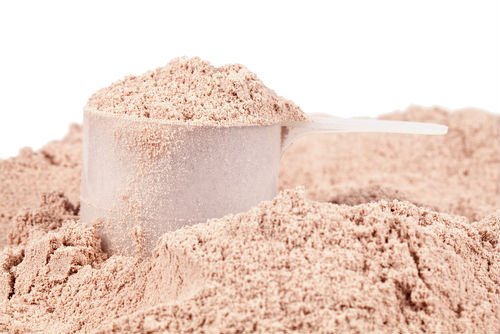Doping substances hazardous to health, not natural ... Protein powder are subject to numerous charges. However, in the weight room, they also provides many virtues.
So who listen? Opinions differ, and it is not always easy to navigate among all these rumors and hearsay. Should we listen to the seller of nutritional supplements that seeks to invent the virtues of his product or does it instead to trust his training partner who "heard" it would not be better to consume protein powder ?
In my view, there is only one reliable and neutral to take into account the science source. Each year, hundreds of scientific studies are carried out on dietary supplements, and therefore the protein powder. You will find throughout this article references to studies on this product.
For starters, it seems important to describe what protein powder, especially where it comes from and how it is made, it should already be possible to overcome some doubts about this as criticism.
What is protein powder?
Protein powder is extracted from several sources: milk, egg, soy or peas. The most common and most used are those derived from milk, it is therefore these that I will discuss in more detail.
To understand where they are coming from the protein powder, we must go back to the mid-nineteenth century. An American named Gail Borden invented powdered milk in 1850. The process of removing the water in the milk to keep it long and easy transport, was quickly adopted by the dairy industry.
Most proteins are currently sold in powdered milk "improved" powder. A simplified description of the manufacturing process:
- We start by removing water contained in milk. Thus obtained dried milk, commonly called milk powder, and which is found in any large area.
- This dehydrated milk still contains fat and sugar (lactose) that we will remove as much as possible to keep (almost) only proteins. Depending on the degree of filtration, so we will obtain a powder containing between 80 and 95% protein.
- Finally, there are often a last step is to add a flavor and / or sweetener.
- Voila, protein powders are ready to be sold and consumed.
We therefore see that there is nothing extraordinary in the protein powder, but despite this, they still have a bad reputation, unfortunately there are dozens of ideas for this product. Here are those I believe the most common and widespread:
Protein powder = doping
This statement is completely false, protein powders are not on any "list of banned substances and products."
While many people still think that they are doping, it certainly comes from the fact that there are 20 to 30 years, analyzes have shown that certain batches of protein (mostly from the USA) contained traces steroids.
Nowadays, it seems unthinkable, because the law is very clear about it, and the controls are frequent and mandatory, as in the food industry.
In summary: protein powders are absolutely not considered doping, and can not be, because that would imply that we should also ban all foods that contain protein (meat, fish, eggs, dairy products, ...).
This is not a natural product
If by "natural" means "being in nature" or "that is not the result of human labor," then yes, in this case protein powders are not natural, because actually we can not find this form in nature. But this does not apply only to protein powder, it is also the case of many foods that humans modify in order to facilitate storage or use for example. This is the case of the mash or the dehydrated milk powder.
Protein powder is simply extracted from food, and again, it is far from being an exception since it is also the case of many products:
- Carbohydrate sugar beet or sugar cane is extracted to yield a concentrate, powdered sugar.
- To the lipids, can be extracted from milk or plant and then concentrated to obtain a form of butter or oil.
While we do not find protein powder directly in nature, but this is not why it is not a natural product. If you want examples of products that are not natural, it's not complicated, just go to your supermarket and look at the ingredients list of a few items (especially the radius cakes and cereals) . You will find many additives, colorings and other conservatives who do not normally have much to do in the human diet.
In summary: protein powder is extracted from natural products, it is simply a "by-product" concentrated protein, like powdered sugar is concentrated carbohydrate and lipid butter.
It is dangerous to health
This is obviously false, as we have seen in point 1, protein powders are not doping. There exists today the day no serious scientific study demonstrating that to consume protein powder form can have any negative effect on health.
Also often means that it is bad for the kidneys, but again, it has never been demonstrated that protein powders have a negative effect on kidney of a healthy individual function.
By cons, if you already have kidney problems, it is recommended to monitor your diet, do not abuse protein powder (this does not mean that it is prohibited) and especially to consult a nephrologist for regular monitoring .
In summary: no, protein powder does not pose a risk to health. And it is important to realize and understand is that it exists in the current supply of modern societies hundreds of products that are more unhealthy (even dangerous in the medium and long term) as protein powder.
Protein powder make you fat
That a food makes you fat is not very relevant, because all foods are likely to gain weight if consumed in excess.
The protein is a food powder as the other, that is to say it contains calories. If today your daily energy intake (AEJ) is such that your weight is stable, and if you want to add protein powder to your diet (for whatever reason), it will have the effect of increasing your AEJ as with any other protein source (meat, fish, etc.).
At this point, it is possible that you gain weight. It is not the fact of consuming protein powder which is the direct cause, but having grown overnight your calorie intake. The result would be the same if you added eg two additional portions of meat per day instead of two servings of protein powder.
I have also heard many times that it "takes the fat" once you stop consuming protein powder or muscle mass gained during one consumes protein powder disappears or turns into fat when you stop to eat. All this is clearly false, if you know how to manage your diet and continue to train.
In summary: protein powder does not make you fat, if you add them to your diet properly. They contain calories and should therefore be considered as any other food. For example, two doses of protein powder (40g each) correspond approximately 300kcal and 60g protein, it is not negligible.
Studies have shown that even certain types of protein powder may have a "grease" effect.
Fast massive muscle gains
Protein powder is not a magic food, and it is important not to compare to doping. By cons, it is true that certain types of proteins (eg, whey protein, whey or English) have properties favoring the taking of lean mass (muscle).
Many people want to start consuming protein powder in the hope to gain muscle quickly. But do not forget that the protein is simply the "material" of building muscle, and if the body does not receive any signal, there is no reason to build muscle. It is therefore necessary to train (weight training) so that the body perceives a signal indicating that he should "build" muscle, and proteins (powdered or not) play an important role in this process.
In summary: protein powder will not be a miracle. But if you follow a good workout, they can for example help you increase your daily protein intake to gain muscle a little faster or better recover from one session to another.
It is useless, solid foods are sufficient
This phrase often returns, both on the Internet and in the weight room, yet it is not just my opinion. I would say that protein powders are not necessary, and it is quite possible to obtain a good level of fitness without eating. By cons, it can be interesting to use because they have several advantages over conventional food, here are a few:
- a protein powder is dehydrated, this property allows you to store and especially easily store the product: no need to keep it in the freezer or refrigerator as is the case of meat or fish for example. In addition, the deadline for consumption is often more than one year.
- The protein is in powder form, so it is very easy to carry and consume quickly (a few water and the mixture is prepared is added). This can be useful in many cases: for example, providing the body with a source of protein immediately after training, or to add protein to a snack taken in the afternoon at his place of work, etc. .
- Some types of protein powder like whey protein (whey) or casein (a protein found for example in cheese) have very interesting properties: First, in addition to stimulate muscle anabolism (1-2), has the ability to be quickly digested and assimilated by the body, which is useful before or after strenuous exercise (3). The second has the ability to coagulate, this will slow the absorption of protein during digestion and provide the body with protein for several hours.
In summary: protein powders are neither inferior nor superior to solid protein sources (meat, fish, eggs, etc.), each type of food has its advantages and disadvantages, and it would be a shame to deprive the one of them. If used in an intelligent manner, the protein powder can be useful in many cases.









Aucun commentaire:
Enregistrer un commentaire